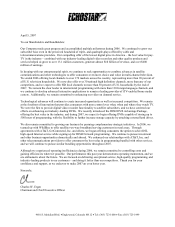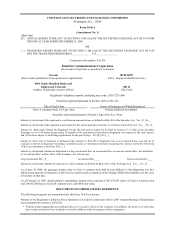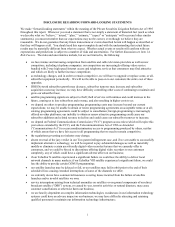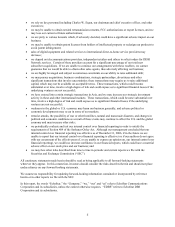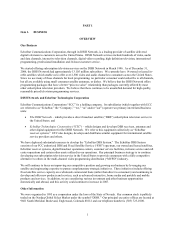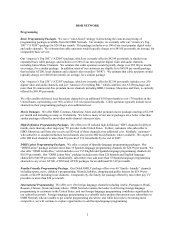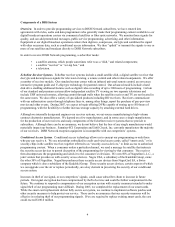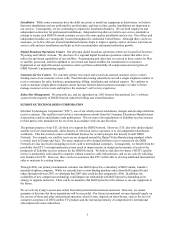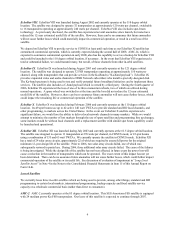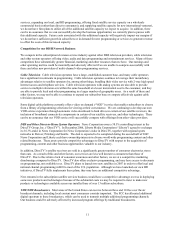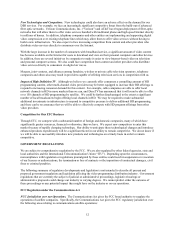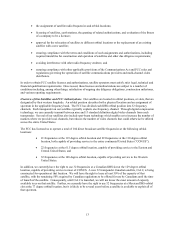Dish Network 2006 Annual Report Download - page 13
Download and view the complete annual report
Please find page 13 of the 2006 Dish Network annual report below. You can navigate through the pages in the report by either clicking on the pages listed below, or by using the keyword search tool below to find specific information within the annual report.3
Sales, Marketing and Distribution
Sales Channels. While we offer receiver systems and programming directly, a majority of our new subscriber
acquisitions are generated by independent businesses offering our products and services, including small satellite
retailers, direct marketing groups, local and regional consumer electronics stores, nationwide retailers,
telecommunications providers and others.
We generally pay these independent businesses an incentive upon activation of each new subscriber they acquire for
us. We also typically pay them a small monthly incentive for up to 60 months provided the customer continuously
subscribes to our programming and the retailer achieves required minimum subscriber acquisition goals.
Marketing. We use print, radio and television, on a local and national basis, to advertise and promote the DISH
Network. We also offer point-of-sale literature, product displays, demonstration kiosks and signage for retail
outlets. We provide guides that describe DISH Network products and services to our retailers and distributors and
conduct periodic educational seminars. Our mobile sales and marketing team visits retail outlets regularly to
reinforce training and ensure that these outlets have proper point-of-sale materials for our current promotions.
Additionally, we dedicate a DISH Network television channel and websites to provide retailers and customers with
information about special services and promotions that we offer from time to time.
Acquisition Strategy. Our future success in the subscription television industry depends on, among other factors,
our ability to acquire and retain DISH Network subscribers. We provide varying levels of subsidies and incentives
to attract customers, including leased, free or subsidized receiver systems, installations, programming and other
items. This marketing strategy emphasizes our long-term business strategy of maximizing future revenue by rapidly
increasing our subscriber base. Since we subsidize consumer up-front costs, we incur significant costs each time we
acquire a new subscriber. Although there can be no assurance, we believe that, on average, we will be able to fully
recoup the up-front costs of subscriber acquisition from future subscription television services revenue.
DISH Network subscribers have the choice of purchasing or leasing the satellite receiver and other equipment
necessary to receive our programming. As a result of our promotions, most of our new subscribers choose to lease
their equipment, including receiver models that provide HD, DVR, HD DVR and other advanced capabilities for
multiple rooms. Many of these lease programs require the consumer to commit to continue to subscribe to a
qualifying programming package for 18 months. Subscribers in our lease programs are required to return the
receivers and certain other equipment to us or be charged for the equipment if they terminate service. To the extent
we successfully retrieve and cost-effectively recondition and redeploy leased equipment from subscribers who
terminate service, we are able to reduce the cost of future new subscriber acquisition. However, these cost savings
are limited as technological advances and consumer demand for new features result in the need to replace older
equipment for customers over time.
We base our marketing promotions on, among other things, current competitive conditions. In some cases, if
competition increases, or we determine for any other reason that it is necessary to increase our subscriber acquisition
costs to attract new customers, our profitability and costs of operation would be adversely affected.
Bundling Alliances
AT&T, Inc. (“AT&T”) and other telecommunications providers offer DISH Network programming bundled with
broadband, telephony and other services. While these providers in the aggregate currently account for less than 25%
of our gross subscriber additions, the loss of certain of these relationships could have an adverse effect on our new
subscriber additions to the extent other distribution channels could not be developed in those markets. During 2006,
AT&T began deploying fiber-optic networks that allow it to offer video services directly to millions of homes.
Other telecommunications companies have announced similar plans. Our net new subscriber additions and certain
of our other key operating metrics could be adversely affected to the extent AT&T de-emphasizes, or discontinues
altogether, its efforts to acquire DISH Network subscribers, and as a result of competition from video services offered
by AT&T or other telecommunications companies. Moreover, there can be no assurance that we will be successful in
developing significant new bundling opportunities with other telecommunications companies.


